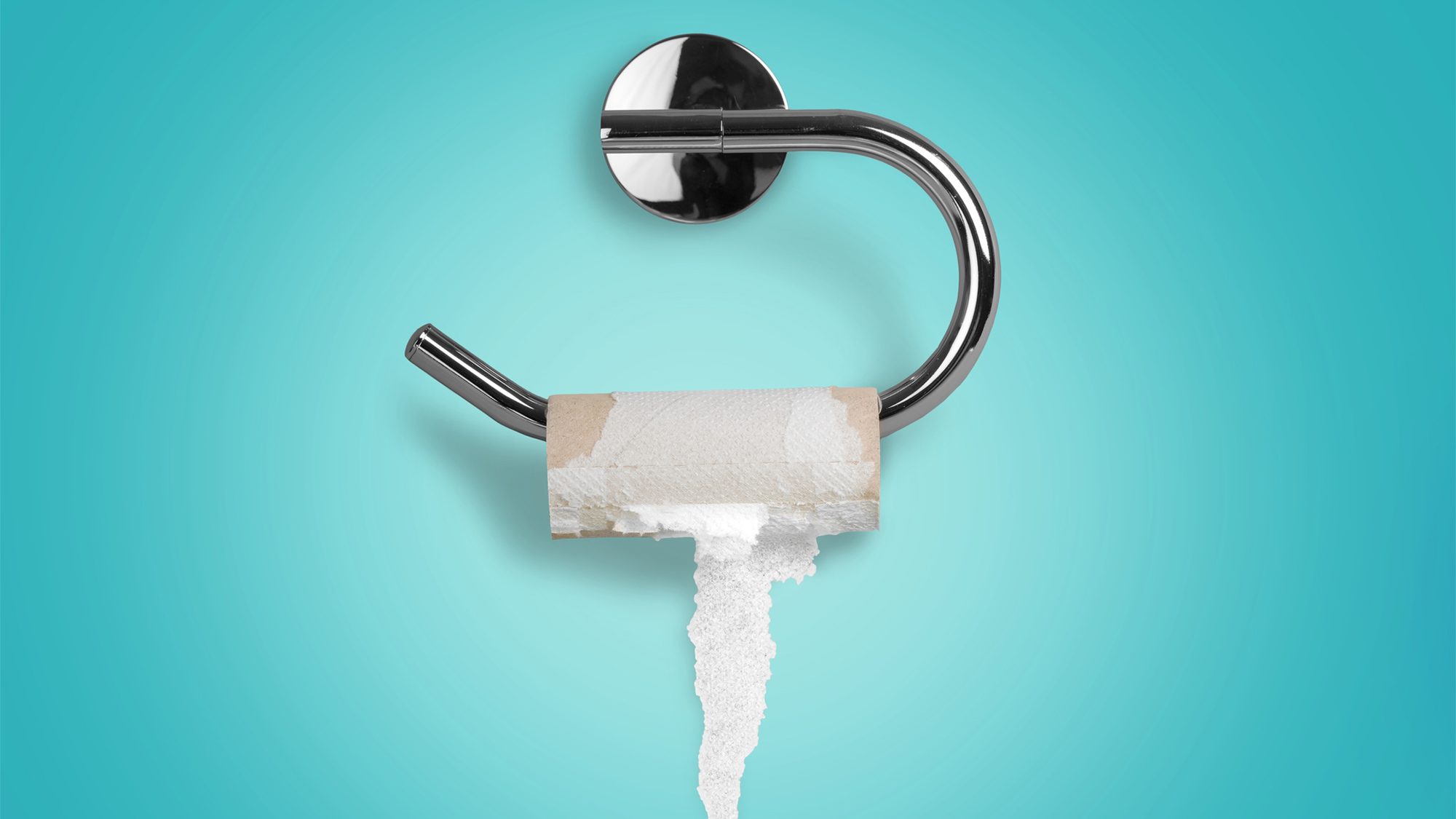
artisteer/Getty Images
Now that the coronavirus is forcing many Americans to practice social distancing and hunker down at home, it’s understandable that this is putting some strain on our supplies of household goods—and our homes.
Take toilet paper, for instance. Some of us have stockpiled this bathroom necessity to a fault. However, others who initially downplayed COVID-19-related concerns are ending up short as they stare at empty store shelves, or longer-than-anticipated waits for backed-up deliveries.
So what’s a poor fellow without toilet paper to do? Many, it appears, are reaching for what they assume is the next best alternative: Paper towels, tissues, baby wipes, or (for the truly hygiene-obsessed) antiseptic wipes.
But this can lead to big, big problems once they’re flushed down the pipes.
Can you flush paper towels down the toilet?
Yes, desperate times call for desperate measures, but this doesn’t mean you can simply toss any paper product down the john. The reason: These items don’t break down as easily as toilet paper, and can get stuck and clog pipes.
“Toilet paper is designed to break down or disintegrate quickly with water as it flows down the drain line,” says Doyle James, president of Mr. Rooter Plumbing. “Paper towels, personal wipes, Clorox wipes, and baby wipes are often built with a heavier or tighter weave than toilet paper to have a scrubbing capability. This heavy weave will not break down or disintegrate, and result in a bigger headache than homeowners may consider.”
The result? These wipes may meet up with other items you’ve sent down other drains in your home—such as soaps and detergents—and form a dense, pipe-clogging mass known as a “fatberg“.
“When they reach the heavy-weave products, they bind or cling and begin to create a fatberg,” James continues. “Once they have formed, a mechanical machine is needed to break them down while adding a large volume of water to move them down the drain line.”
In other words, you could be facing a toilet that doesn’t flush. Odds are you’ll eventually have to hire a plumber to move it along, but even then, fatbergs can lead to further problems down the line within the community sewage system.
“Once you’ve moved it to the city sewer system, they can begin gathering with other heavy-weave products and clump back together,” James says.
In London last year, one such fatberg became so massive, it purportedly rivaled the size of 11 double-decker buses. Yes, we’re serious.
#PublicWorks #WaterandSewer
We understand due to high demand toilet paper might not be available, and wipes may be an alternative. We urge the public to please dispose of their wipes in a waste basket. Please do not flush wipes, even if they say they are flushable, they are not. pic.twitter.com/g6EPimsawi— Needham DPW (@NeedhamDPW) March 18, 2020
“Flushing anything but toilet paper can be harmful to the health of your pipes, as well as the main city pipes that carry waste away and the pump systems located at those facilities,” says Aaron Mulder, co-owner and operations manager for Mr. Rooter Plumbing of San Antonio. “Each year, cities across the globe are faced with hefty costs associated with removing wipes and other nonflushable items from plants and sewage systems.”
What the toilet paper shortage could mean for sanitation
Already, sanitation officials have noticed an uptick in such problems. On March 22, for example, crews rushed to an area of Tiburon, a town in California’s Marin County, to clean up 100 gallons of wastewater that had overflowed onto the road.
“I’m sure it’s happening all across the state,” Tony Rubio, district manager of Sanitary District 5, told the San Francisco Chronicle.
And as this pandemic lengthens, officials worry it could lead to backups of epic proportions where human waste could seep onto streets across the country.
🗣 Reminder – Only #toiletpaper 🧻 and #humanwaste should be flushed down your 🚽 toilet. Please refrain from flushing #papertowels, #napkins, #tissue, #wipes and non-flushables. Those items should be tossed in the trash, sealed, and disposed of properly.#wipesclogpipes pic.twitter.com/7ByQPKWdXd
— LA Sanitation & Environment ♻️💧🌳 (@LACitySAN) March 18, 2020
Aren’t baby wipes flushable?
But wait, what if your baby or sanitizing wipes label claims they’re flushable? Yes, some wipes may be labeled “flushable,” but this may not actually be the case in large volumes, according to a recent study.
Last year, Ryerson University in Toronto tested 101 different types of wipes, including more than 20 that were purported to be fine to flush. Not a single one broke apart safely in order to pass through the sewer system test they developed.
This is the best use of fatbergs we can think of. But remember, its better to never create fatbergs in the first place!
❌DON'T wash fats, oils or grease down your drain
❌DON'T flush paper towels or wipes
✅DO only flush the 3 P's (Pee, Poop, toilet Paper) https://t.co/u9jMhpNzWt— Fort Worth Water (@FWWater) March 18, 2020
Your best bet? Try not to panic in the store and just buy the toilet paper your immediate family normally needs—and no more. This way, there’s a better chance that enough TP will be available for your fellow neighbors and you’ll be helping to safeguard the integrity of your pipes and the sewer system at large.
Or, in these turbulent times, you might consider the French method of toileting to solve your TP dilemma: the bidet.
“These devices are a good alternative as they typically help to reduce the amount of toilet paper you use,” says Mulder.
Or, if you’re in crisis mode and must use napkins or paper towels where you are, try wetting them first and make sure you dispose of them in a waste basket instead. Remember that only the “three P’s” should be tossed down the toilet: pee, poop, and (toilet) paper.
The post Why Your Toilet Paper Shortage Could Have Horrific Consequences for Your House appeared first on Real Estate News & Insights | realtor.com®.
source https://www.realtor.com/news/trends/why-your-toilet-paper-shortgage-could-ruin-your-house/
No comments:
Post a Comment